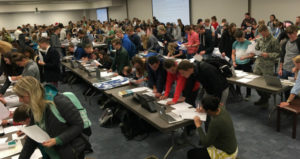
Three Guidelines and Two Workarounds for Tackling Makeup Exam Policies
Are you one of the many instructors who loathe makeup exam requests? Makeup exams often create more work and can put us in the awkward position of judging the truthfulness of our students’ excuses. Although we can’t avoid makeup requests entirely, we can better prepare ourselves and our students by having a transparent and fair makeup exam policy. When designing your policy, always ask yourself: Does the policy allow students to learn what you want them to learn in your course?












